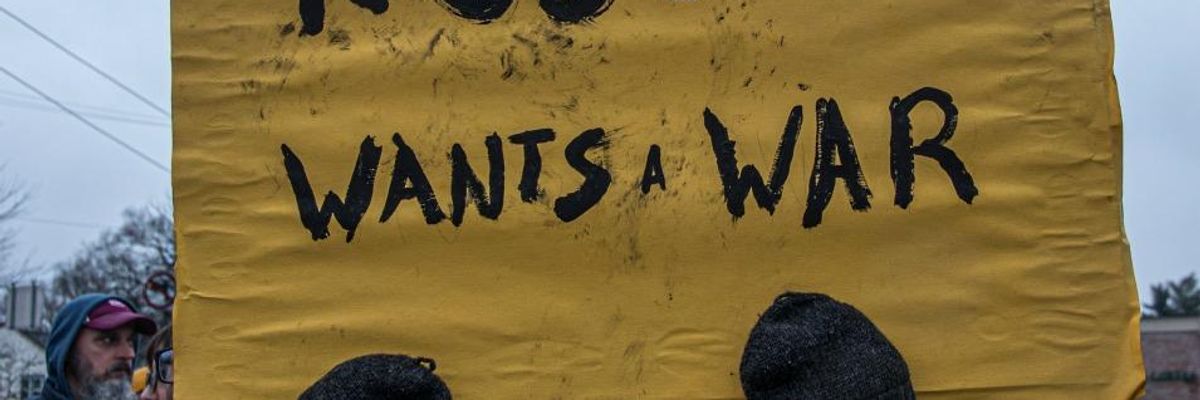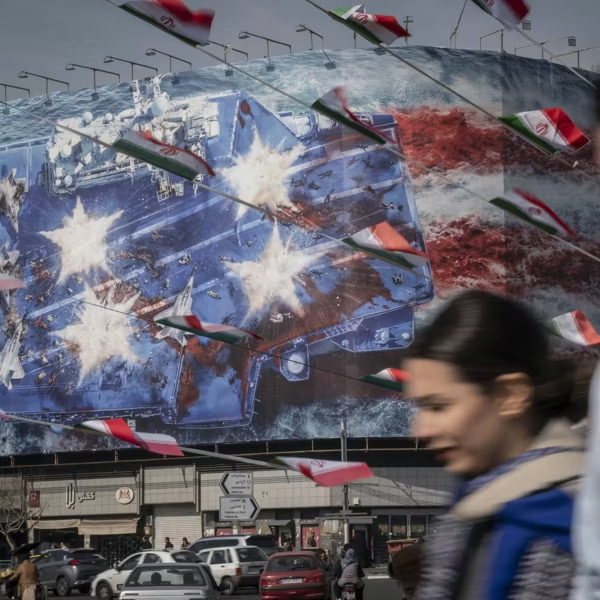
A protester holds a placard that says Nobody Wants a War during the demonstration. (Photo: Whitney Saleski/Echoes Wire/Barcroft Media via Getty Images)
'Stop Escalation': World Leaders Call on Trump to End Warmongering and Resume Diplomacy With Iran
"Unless real diplomacy begins, the risk for confrontation will not dissipate for real."
Following Iran's military strike on a U.S. air base Tuesday night, world leaders called on President Donald Trump to show restraint and follow the lead of Iranian Foreign Minister Javad Zarif, who said his country does not "seek escalation of war."
Iran targeted the al-Asad airbase in eastern Iraq four days and another near Erbil after Trump ordered the assassination of Iranian military commander Qasem Soleimani, provoking international outrage and fears of war with Iran.
The office of U.N. Secretary-General Antonio Guterres said Wednesday that his message to Trump and Iranian leaders was simple.
"Stop escalation. Exercise maximum restraint. Re-start dialogue. Renew international cooperation," said Guterres. "It is our common duty to make every effort to avoid a war in the Gulf that the world cannot afford. We must not forget the terrible human suffering caused by war. As always, ordinary people pay the highest price."
Following Tuesday's air strikes, Iran's Zarif reiterated that while his country does not want to escalate tensions further, Iranians "will defend ourselves against any aggression"--leaving it up to Trump whether further violence will ensue.
In Sweden, Finnish and Swedish leaders held a joint press conference to call for "dialogue [and] de-escalation."
"We need to find ways for a dialogue, we need to find a way for peaceful progress from now on and we need to look to the future, forward from now on," said Finnish Prime Minister Sanna Marin.
European Union leaders said they were prepared to do "everything possible to rekindle talks."
"The use of weapons must stop now to give space for dialogue," European Commission President Ursula van der Leyden said in a statement.
"It is in no one's interests to turn up the spiral of violence even further," added Josep Borrell, the EU's head of external affairs.
British Labour lawmaker Lisa Nandy called on all world leaders to "stand up to Trump," offering a contrast to Prime Minister Boris Johnson's statement in support of the United States' "right to protect its bases and personnel."
Zarif called on the U.S. government to "come to its senses" and said the United States' European allies must pressure high-level U.S. officials to do all they can to urge de-escalation by Trump.
"Europe can play a useful role by informing the United States of the serious error in their analysis--that they should stop listening to clowns," said Zarif. "That they should base their policy based on reality and not some illusions of some clowns who have ambitions elsewhere."
In an address to Americans on Wednesday morning, Trump signaled that the U.S. may not launch more strikes for the time being, saying, "Iran appears to be standing down, which is a good thing for all parties concerned and a very good thing for the world."
But the president also began his speech with a threat, saying the country "will never be allowed to have a nuclear weapon."
Although Trump did not signal that the U.S. would retaliate against Iran for Tuesday's air strike, Trita Parsi of the Quincy Institute for Responsible Statecraft said, the U.S. president has yet to show commitment to the kind of diplomacy world leaders are demanding.
"Unless real diplomacy begins, the risk for confrontation will not dissipate for real," Parsi tweeted.
An Urgent Message From Our Co-Founder
Dear Common Dreams reader, The U.S. is on a fast track to authoritarianism like nothing I've ever seen. Meanwhile, corporate news outlets are utterly capitulating to Trump, twisting their coverage to avoid drawing his ire while lining up to stuff cash in his pockets. That's why I believe that Common Dreams is doing the best and most consequential reporting that we've ever done. Our small but mighty team is a progressive reporting powerhouse, covering the news every day that the corporate media never will. Our mission has always been simple: To inform. To inspire. And to ignite change for the common good. Now here's the key piece that I want all our readers to understand: None of this would be possible without your financial support. That's not just some fundraising cliche. It's the absolute and literal truth. We don't accept corporate advertising and never will. We don't have a paywall because we don't think people should be blocked from critical news based on their ability to pay. Everything we do is funded by the donations of readers like you. Will you donate now to help power the nonprofit, independent reporting of Common Dreams? Thank you for being a vital member of our community. Together, we can keep independent journalism alive when it’s needed most. - Craig Brown, Co-founder |
Following Iran's military strike on a U.S. air base Tuesday night, world leaders called on President Donald Trump to show restraint and follow the lead of Iranian Foreign Minister Javad Zarif, who said his country does not "seek escalation of war."
Iran targeted the al-Asad airbase in eastern Iraq four days and another near Erbil after Trump ordered the assassination of Iranian military commander Qasem Soleimani, provoking international outrage and fears of war with Iran.
The office of U.N. Secretary-General Antonio Guterres said Wednesday that his message to Trump and Iranian leaders was simple.
"Stop escalation. Exercise maximum restraint. Re-start dialogue. Renew international cooperation," said Guterres. "It is our common duty to make every effort to avoid a war in the Gulf that the world cannot afford. We must not forget the terrible human suffering caused by war. As always, ordinary people pay the highest price."
Following Tuesday's air strikes, Iran's Zarif reiterated that while his country does not want to escalate tensions further, Iranians "will defend ourselves against any aggression"--leaving it up to Trump whether further violence will ensue.
In Sweden, Finnish and Swedish leaders held a joint press conference to call for "dialogue [and] de-escalation."
"We need to find ways for a dialogue, we need to find a way for peaceful progress from now on and we need to look to the future, forward from now on," said Finnish Prime Minister Sanna Marin.
European Union leaders said they were prepared to do "everything possible to rekindle talks."
"The use of weapons must stop now to give space for dialogue," European Commission President Ursula van der Leyden said in a statement.
"It is in no one's interests to turn up the spiral of violence even further," added Josep Borrell, the EU's head of external affairs.
British Labour lawmaker Lisa Nandy called on all world leaders to "stand up to Trump," offering a contrast to Prime Minister Boris Johnson's statement in support of the United States' "right to protect its bases and personnel."
Zarif called on the U.S. government to "come to its senses" and said the United States' European allies must pressure high-level U.S. officials to do all they can to urge de-escalation by Trump.
"Europe can play a useful role by informing the United States of the serious error in their analysis--that they should stop listening to clowns," said Zarif. "That they should base their policy based on reality and not some illusions of some clowns who have ambitions elsewhere."
In an address to Americans on Wednesday morning, Trump signaled that the U.S. may not launch more strikes for the time being, saying, "Iran appears to be standing down, which is a good thing for all parties concerned and a very good thing for the world."
But the president also began his speech with a threat, saying the country "will never be allowed to have a nuclear weapon."
Although Trump did not signal that the U.S. would retaliate against Iran for Tuesday's air strike, Trita Parsi of the Quincy Institute for Responsible Statecraft said, the U.S. president has yet to show commitment to the kind of diplomacy world leaders are demanding.
"Unless real diplomacy begins, the risk for confrontation will not dissipate for real," Parsi tweeted.
Following Iran's military strike on a U.S. air base Tuesday night, world leaders called on President Donald Trump to show restraint and follow the lead of Iranian Foreign Minister Javad Zarif, who said his country does not "seek escalation of war."
Iran targeted the al-Asad airbase in eastern Iraq four days and another near Erbil after Trump ordered the assassination of Iranian military commander Qasem Soleimani, provoking international outrage and fears of war with Iran.
The office of U.N. Secretary-General Antonio Guterres said Wednesday that his message to Trump and Iranian leaders was simple.
"Stop escalation. Exercise maximum restraint. Re-start dialogue. Renew international cooperation," said Guterres. "It is our common duty to make every effort to avoid a war in the Gulf that the world cannot afford. We must not forget the terrible human suffering caused by war. As always, ordinary people pay the highest price."
Following Tuesday's air strikes, Iran's Zarif reiterated that while his country does not want to escalate tensions further, Iranians "will defend ourselves against any aggression"--leaving it up to Trump whether further violence will ensue.
In Sweden, Finnish and Swedish leaders held a joint press conference to call for "dialogue [and] de-escalation."
"We need to find ways for a dialogue, we need to find a way for peaceful progress from now on and we need to look to the future, forward from now on," said Finnish Prime Minister Sanna Marin.
European Union leaders said they were prepared to do "everything possible to rekindle talks."
"The use of weapons must stop now to give space for dialogue," European Commission President Ursula van der Leyden said in a statement.
"It is in no one's interests to turn up the spiral of violence even further," added Josep Borrell, the EU's head of external affairs.
British Labour lawmaker Lisa Nandy called on all world leaders to "stand up to Trump," offering a contrast to Prime Minister Boris Johnson's statement in support of the United States' "right to protect its bases and personnel."
Zarif called on the U.S. government to "come to its senses" and said the United States' European allies must pressure high-level U.S. officials to do all they can to urge de-escalation by Trump.
"Europe can play a useful role by informing the United States of the serious error in their analysis--that they should stop listening to clowns," said Zarif. "That they should base their policy based on reality and not some illusions of some clowns who have ambitions elsewhere."
In an address to Americans on Wednesday morning, Trump signaled that the U.S. may not launch more strikes for the time being, saying, "Iran appears to be standing down, which is a good thing for all parties concerned and a very good thing for the world."
But the president also began his speech with a threat, saying the country "will never be allowed to have a nuclear weapon."
Although Trump did not signal that the U.S. would retaliate against Iran for Tuesday's air strike, Trita Parsi of the Quincy Institute for Responsible Statecraft said, the U.S. president has yet to show commitment to the kind of diplomacy world leaders are demanding.
"Unless real diplomacy begins, the risk for confrontation will not dissipate for real," Parsi tweeted.

